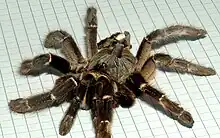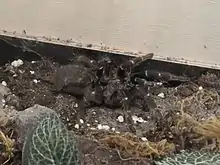| Burst horned baboon tarantula | |
|---|---|
_(5984202033).jpg.webp) | |
 | |
| An immature (above), and the exuviae of an adult female (below) | |
| Scientific classification | |
| Domain: | Eukaryota |
| Kingdom: | Animalia |
| Phylum: | Arthropoda |
| Subphylum: | Chelicerata |
| Class: | Arachnida |
| Order: | Araneae |
| Infraorder: | Mygalomorphae |
| Family: | Theraphosidae |
| Genus: | Ceratogyrus |
| Species: | C. darlingi |
| Binomial name | |
| Ceratogyrus darlingi | |
| Synonyms[1] | |
| |
Ceratogyrus darlingi (commonly called burst horned baboon tarantula or African rear-horned baboon tarantula, synonym Ceratogyrus bechuanicus) is a theraphosid spider from southern Africa, mainly Botswana and Lesotho. They reach a body length of about 5 inches (130 mm) and are ash-gray, mud-brown to black. The peltidium features a black foveal horn.[2]
As pets

C. darlingi, often still known under its obsolete name C. bechuanicus, is the most common Ceratogyrus species held in captivity, although it is very defensive and fast. When kept in captivity, it requires dry substrate, such as coconut fiber, on which to live. This allows it to burrow, as they are obligate burrowers. As this species is from a very arid habitat, it cannot cope with too much moisture.
They will readily take crickets, roaches, and superworms but tend to shy away from large prey items. Food is usually pulled in and eaten inside the burrow. Molting also occurs inside the burrow.
Pairs will breed readily and quickly. Females could live an approximate 10 to 15 years in captivity.
References
- 1 2 "Taxon details Ceratogyrus darlingi Pocock, 1897". World Spider Catalog. Natural History Museum Bern. Retrieved 2016-06-02.
- ↑ Minax Tarantulas – Ceratogyrus bechuanicus Archived September 29, 2007, at the Wayback Machine
External links